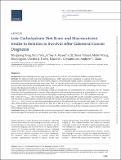Low-Carbohydrate Diet Score and Macronutrient Intake in Relation to Survival After Colorectal Cancer Diagnosis
Author(s)
Song, Mingyang; Wu, Kana; Meyerhardt, Jeffrey A; Yilmaz, Omer; Wang, Molin; Ogino, Shuji; Fuchs, Charles S; Giovannucci, Edward L; Chan, Andrew T; ... Show more Show less
DownloadPublished version (1007.Kb)
Publisher with Creative Commons License
Publisher with Creative Commons License
Creative Commons Attribution
Terms of use
Metadata
Show full item recordAbstract
<jats:title>Abstract</jats:title>
<jats:sec>
<jats:title>Background</jats:title>
<jats:p>A low-carbohydrate diet may improve cancer survival, but relevant clinical evidence remains limited.</jats:p>
</jats:sec>
<jats:sec>
<jats:title>Methods</jats:title>
<jats:p>We followed 1542 stages I to III colorectal cancer (CRC) patients who completed a validated food frequency questionnaire between 6 months and 4 years after diagnosis. We calculated overall, animal-, and plant-rich, low-carbohydrate diet scores and examined their associations with CRC-specific and overall mortality using Cox proportional hazards regression after adjusting for potential predictors for cancer survival. We also assessed the intake and changes of macronutrients after diagnosis. Statistical tests were two-sided.</jats:p>
</jats:sec>
<jats:sec>
<jats:title>Results</jats:title>
<jats:p>Although no association was found for overall and animal-rich low-carbohydrate diet score, plant-rich, low-carbohydrate diet, which emphasizes plant sources of fat and protein with moderate consumption of animal products, was associated with lower CRC-specific mortality (hazard ratio [HR] comparing extreme quartiles = 0.37, 95% confidence interval [CI] = 0.25 to 0.57, Ptrend < .001). Carbohydrate intake was associated with higher CRC-specific mortality, and this association was restricted to carbohydrate consumed from refined starches and sugars (HR per one-SD increment = 1.36, 95% CI = 1.14 to 1.62, Ptrend < .001). In contrast, replacing carbohydrate with plant fat and protein was associated with lower CRC-specific mortality, with the HR per one-SD increment of 0.81 (95% CI = 0.69 to 0.95, Ptrend = .01) for plant fat and 0.77 (95% CI = 0.62 to 0.95, Ptrend = .02) for plant protein. Similar results were obtained for overall mortality and when changes in macronutrient intake after diagnosis were assessed.</jats:p>
</jats:sec>
<jats:sec>
<jats:title>Conclusion</jats:title>
<jats:p>Plant-rich, low-carbohydrate diet score was associated with lower mortality in patients with nonmetastatic CRC. Substituting plant fat and protein for carbohydrate, particularly that from refined starches and sugars, may improve patients’ survival.</jats:p>
</jats:sec>
Date issued
2018Department
Massachusetts Institute of Technology. Department of BiologyJournal
JNCI Cancer Spectrum
Publisher
Oxford University Press (OUP)
Citation
Song, Mingyang, Wu, Kana, Meyerhardt, Jeffrey A, Yilmaz, Omer, Wang, Molin et al. 2018. "Low-Carbohydrate Diet Score and Macronutrient Intake in Relation to Survival After Colorectal Cancer Diagnosis." JNCI Cancer Spectrum, 2 (4).
Version: Final published version